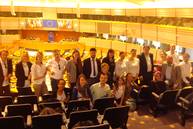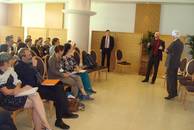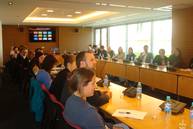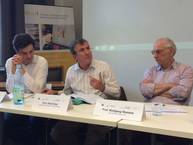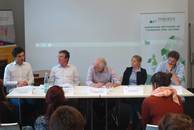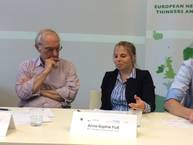

THESEUS Europe@Work 2015
“European Energy and Climate Policy”
Paris and Brussels, 8-12 June 2015
In the context of Europe@Work 2015, 30 international master students from the fields of politics and economics spent the days from 8 to 12 June in Paris and Brussels to discuss on "European Energy and Climate Policy". During their excursion, they got the chance to meet various decision-makers and experts and to visit numerous crucial institutions. The debated topics addressed the development and associated challenges of European Energy Policy, including risks concerning market stability, energy prices, the Emissions Trading System (ETS), benchmarks to reduce CO2-Emmissions, the cooperation between member states and incentives for investors.
Among the visitied institutions were the company Electricité de France, the OECD and International Energy Agency, the European Union Institute for Security Studies, the European Climate Fondation and the European Commission. The students came from the University of Cologne, the Turkish-German University and Charles University.
"European Energy Security: Consequences after the Ukraine Crisis. The Future Role of Turkey" - A Roundtable Discussion
The Europe@Work Seminar 2015 was closed with a roundtable discussion on "European Energy Security: Consequences after the Ukraine Crisis. The Future Role of Turkey" on 9 July, 6pm. The roundtable was chaired by Prof. Wolfgang Wessels, Jean Monnet Chair at the University of Cologne. The panellists were Prof. Atila Eralp, Middle East Technical University Ankara (METU) and Dr. Harald Hecking, Institute of Energy Economics, University of Cologne (EWI) as well as two political science and economic students from the University of Cologne. The audience could get engaged in the following open discussion.
The roundtable discussion was introduced by a presentation of the panellists Prof. Atila Eralp and Dr. Harald Hecking. Harald Hecking spoke about the costs of energy supply. With reference to the need for more diversification in energy supply and already existing infrastructure he explained that these could be held limited. He discussed different pipeline projects running from Russia and what the end of South Stream means for Turkey’s energy future.
Atila Eralp presented the main aims of Turkey’s Energy Policy and explained, why the country can be called an energy transit state, but not a hub. He furthermore illustrated Turkey’s indecisive position in supporting the transatlantic energy model of the EU or that of Russia. After that, Eralp commented on Turkey’s general EU-orientation and stressed that Turkey was an important strategic partner for the EU. He stated that Turkey and the EU should agree on energy issues and cooperate more regularly. This included pursuing Turkey’s accession progress and open the still closed Energy Chapter.
Hecking and Eralp concluded that Turkey might become a more important actor in the energy scene due to its geopolitical setting but would need to make the necessary infrastructure investments, ameliorate the rule of law and stop its zigzagging between the EU and Russia.
After the speeches of Prof. Eralp and Dr. Hecking, the two master students Lukas Prinz (Political Science) and Anna-Sophia Fuß (Economics) joined the debate, followed by an open discussion with the audience. One part of the discussion touched upon the question of Turkey-Russia relations. Eralp stated that after the elections in Turkey there might be completely new developments concerning Russia depending on the dominant political attitude.
The roundtable was closed with a nice get-together of all participants.
